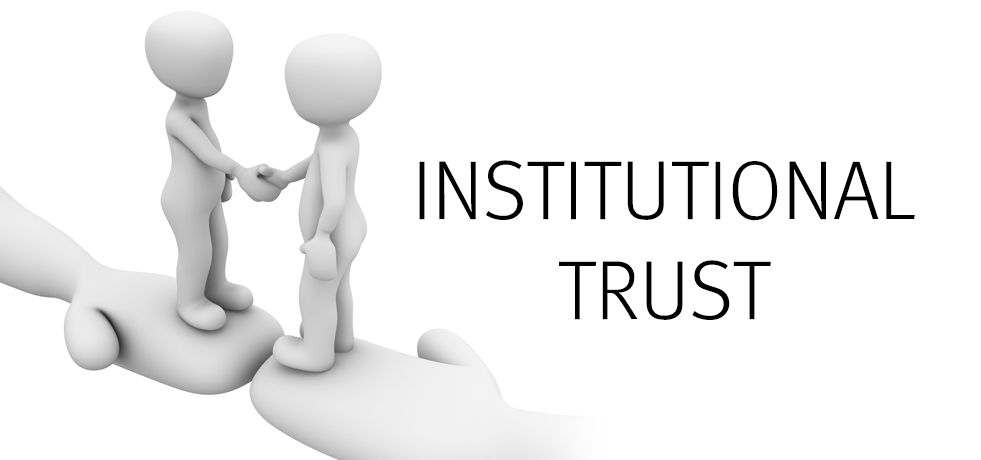Did you know that even as a solo, independent consultant, trust in your brand from the client perspective is as important—if not more so—than the client’s trust in you as a consultant?
For larger consulting firms, this fact probably goes without saying, but among independent consultants, there’s often a perception that it’s more important to be known as a trusted advisor.
I’m not about to suggest that trust in you as a consultant isn’t critical, but I am going to explain why you need to build trust in your business, especially if you want to become a go-to service provider for larger client-companies.
The Concept of Institutional Trust

If your clients have trust in you as a consultant, it’s a form of personal trust. Call it professional trust if you like. Institutional trust on the other hand, is the trust clients have in your consulting firm or brand.
Institutional trust can make the difference between building a solid relationship with a decision-maker in a client-organisation (and getting repeat business from that decision-maker) and being known and trusted by multiple decision makers across the same organisation (and hence getting lots more repeat business).
That’s because in larger companies, trust in your brand (institutional trust) effectively trumps the personal/professional trust that may exist between two parties.
The Advantages of Institutional Trust

Once aware of institutional trust and what it means, the obvious question is “why does it matter to a solo consultant?”
We already touched on one of the advantages of building institutional trust across a client-company, but it might be helpful to expand on that and explore some of the other reasons why institutional trust matters to your consulting business.
You may not always work alone: As your business grows and you get involved in larger projects for your clients, you may wish to bring in other independent consultants or subcontract some work to specialist service providers.
When you do this, your clients trust in you as an individual becomes less relevant, and clients need to trust that your “firm” will deliver, since your firm will be managing the performance of your partners and/or subcontractors.
You may not always remain a one-person-business: While your initial plans may be to work alone as an independent consultant, the time may come when growth requires you to add an employee or two to your firm. At that point, institutional trust will be vital for your prospects and existing clients to enlist your services without insisting upon your personal involvement in their projects.
You need the trust of influencers: When working as an independent consultant, it will often be a decision-maker in the client-company who actually hires you. That decision-maker may or may not be an influential figure in the company (in most cases, he/she will be an influencer).
However, there will inevitably be other key figures with a stake in your project and hence your performance. These influencers may not have the same interpersonal contact with you as the one who hired you, so they’re much more likely to judge you by their impression of your brand.
You may not always be hired by a decision-maker: There may be times, especially if you are engaged by larger companies, when the party who hires you is not a decision maker.
In cases like this, the decision-maker will be vested in your performance, but may not have enough contact with you to build up a trusting professional/personal relationship. If your firm is known and trusted though, the decision-maker will feel much more confident, even though he or she doesn’t get to know you personally.
People move on in their careers: What happens if your usual advocate in a client-company gets a new job elsewhere? If your regular engagements in that company depend on the personal trust of your advocate, those regular engagements may come to an end.
That’s far less likely to happen though, if your firm and its name have become known around the client-business. Institutional trust can help you to continue getting regular work from the client, even though your original advocate is no longer present.
In all the above scenarios, institutional trust will help you retain existing clients and gain new ones. As you may have noticed though, all these scenarios relate to your engagement in client’s projects. Institutional trust actually becomes important long before your prospects become clients, especially when it comes to their engagement with your business online.
The Importance of Building Institutional Trust online

Assuming you will create a website for your independent consulting business (and really you should), its success at attracting leads and prospects will depend upon the development of institutional trust.
After all, few (if any) of your website visitors will know you personally. Most will want to learn how your services set your firm apart from others consulting in the same niche.
Your visitors will also want to see evidence of your consulting capabilities and particularly, of your achievements. Your website can be an invaluable tool for creating trust in your brand and services, as long as you fill it with the right types of content, such as:
- Case studies and statistics that show you understand the problems experienced by your potential clients and that you’re able to help solve them.
- Reviews and testimonials from satisfied clients. Nothing engenders institutional trust more powerfully than the word of those you’ve already helped.
- An “About Us” page that presents you and your firm to website visitors. It should contain details of any credentials or qualifications that help establish you as an expert in your consulting field.
Of course it can be difficult to build a strong case for trust when you are just starting out. You may have no reviews, testimonials, or case studies to include on your website.
In this case you must make sure your “About” page is compelling and presents reasons for visitors to trust your brand.
You can also establish some credibility by writing and publishing articles or blog posts that show you know your business and that of your prospective clients. As soon as you get some clients willing to endorse you though, you should get their testimonials on your web pages posthaste.
How to Gain Institutional Trust from Clients
If all your consulting clients are owners of small businesses, there will be little difference between the personal trust you have from the business owner and his/her trust in your brand.
If you start to work with larger companies though (the ones that can often be ripe with multiple project opportunities), institutional trust can be your multiple-entry ticket to revenue and profit from a long-term client. To enjoy that benefit, you need to begin building institutional trust from the first moments of your engagement.
The following three tips will help your consulting practice become known and trusted across a client-organisation, breaking through the restrictive boundaries of personal trust between hiring party and consultant, and into the richer possibilities offered when institutional trust exists.
Standardise and Organise:
To be trusted as an institution, you need to act like an institution. Create checklists and standard operating procedures for all your business processes, including client meetings, proposal development, status updates, and other processes involving interaction with the client.
Larger client-organisations in particular tend to respond well to a consistent, standardised approach in the way professional service providers conduct their business.
Generate and Maintain a Professional Image:
The design of your presentation slide decks, reports, and deliverables should be professional and uniform to create the image of a professional consulting firm. Similarly, you should invest in the best quality business cards and stationary you can afford.
Even if you’re not personally exposed to all areas of your client’s company, your documentation and presentation materials probably will be. Make that exposure count by ensuring your materials represent your institution in a positive way.
Use “We” and “Us” in Communication:

You may be working solo as an independent consultant, but you can increase the development of institutional trust by referring to your business in the “we” sense (when it makes sense). In other words, talk in terms of “we” and “us” instead of “me” and “I.”
This might seem odd at first, and you will need to be quite careful how and when you talk about “we,” but you can certainly do it when describing your business on your website and in some forms of written communication.
Be an Independent Consulting Institution
It’s not too hard to generate institutional trust, although it can be slow going when you first start out as an independent consultant. Hopefully the thoughts and tips shared in this post will help you to consider the concept and think about how you might represent your new consulting practice.
It will help to take an institutional, rather than individual approach to your independent consulting venture from day one. Give your business a company name, rather than using your own, for example.
Try to get into the mindset of the owner of a consulting firm, instead of a consultant chasing down one assignment after another. The way you think and talk about your business will affect the way others perceive it.
This is not about playing down the personal side of your service, because that’s critical for forming solid relationships within client-companies. It’s about the reality of working with large clients, where your business’ identity will probably precede that of you as a person—at least until you become a familiar face across a company’s various functions and departments.
 Best Regards,
Best Regards,
Rob O’Byrne
Email: robyrne@logisticsbureau.com
Phone: +61 417 417 307


I would add, the prospect doesn’t even need to like you much to have this professional trust.
Hmm. Not so sure of that. Trust Yes. 100%. But people also like dealing with people they like……